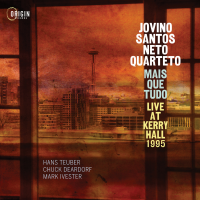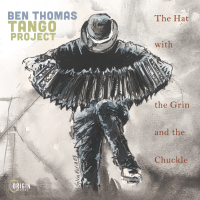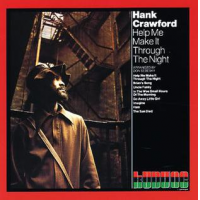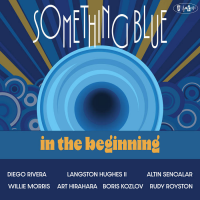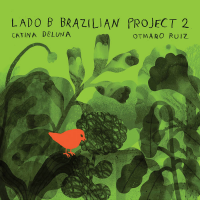Home » Jazz Articles » Liner Notes » John Swana: Philly Gumbo
John Swana: Philly Gumbo
John Swana
electronics
Dizzy Gillespie
trumpet1917 - 1993

Don Patterson
organ, Hammond B31936 - 1988

Charles Fambrough
bass1950 - 2011

Peter Leitch
composer / conductorb.1944

Mulgrew Miller
piano1955 - 2013

Kenny Barron
pianob.1943

Christian McBride
bassb.1972

Tom Harrell
trumpetb.1946
Beginning with Introducing John Swana (Criss 1045) in 1991, regular Criss Cross followers have been fortunate to hear the trumpeter cultivate his art over the course of six singular and highly distinctive albums. On a previous release, The Feeling's Mutual (Criss 1090), John had the opportunity to commit to disc a group including Philadelphia players, namely guitarist

Steve Giordano
guitarb.1952
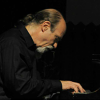
Dave Posmontier
keyboardsSharing the front line with Swana is tenor saxophonist

Bootsie Barnes
saxophone, tenor1937 - 2020

Dizzy Gillespie
trumpet1917 - 1993
At the core of the rhythm section is pianist

Sid Simmons
piano1946 - 2010

Philly Joe Jones
drums1923 - 1985

Grover Washington, Jr.
saxophone1943 - 1999

Byron Landham
drumsb.1969
A graduate of the Eastman School of Music and alumnus of the

Buddy Rich
drums1917 - 1987

Mike Boone
bassCompleting the line-up, we come to drummer

Byron Landham
drumsb.1969

Joey DeFrancesco
organ, Hammond B31971 - 2022
Turning to the music, "Blues For Hicks" gets the pots on and the gumbo simmering with a standard blues progression given a twist by the not so standard use of a bar of three in the second measure. This slight wrinkle doesn't seem to phase these players one bit, with solos from Swana, Barnes ("I think Bootsie plays a great solo on this one," says John), Simmons, and a drum spot from Landham. Although one might assume this original pays homage to pianist

John Hicks
piano1941 - 2006
With another nod to the Philly heritage of jazz bassists, Mike Boone's "Old Head" is dedicated to Arthur Harper. Previously recorded by Boone, this medium tempo line swings lightly, with the middle section sporting a figure that faintly recalls the classic hard bop of

Art Blakey
drums1919 - 1990
Swana and Barnes go it alone for the opening of "Up Jumped Bootsie," the piece's jagged melody marked by some offbeat accents. "I called it 'Up Jumped Bootsie' because in the changes in the first eight bars, it almost sounds like the changes for "Up Jumped Spring" for a second, and then I wanted to name one for Bootsie," declares Swana. The tune's namesake certainly takes the opportunity to strut his stuff, contributing one of his more robust solos. Both Swana and Simmons have their own heated moments, as does Landham, contributing another one of his tremendously tuneful solos.
Living up to its title, "Soulful One" makes the most of an attractive line taken at a relaxed waltz tempo. "I originally wrote it in four and then I needed a ? tune," John says. "So, I tried to play the melody in ?. In four it sounded more like a Blakey kind of tune and in three it sounded different. I guess I was thinking about my daughter and her mother and also my friend Trish, who just passed away." Following Swana's sincere opening statement, Boone takes a short solo before the trumpeter returns. Simmons is up next, and then we hear Swana riding out the closing vamp.
Stepping into the ballad spotlight, Swana picks up his flugelhorn for "John Wayne." "I call it that because the melody almost reminds me of

John Coltrane
saxophone1926 - 1967

Wayne Shorter
saxophone1933 - 2023
Mike Boone and Bruce Trojan composed "Better Late Than Never" and it has all the earmarks of a classic in the making, with Landham's Afro-Cuban drum beat serving as an opening and closing tag each time through the song's form. The title track from one of Boone's own albums, solo space is provided for Swana, Barnes, and Simmons.
Offering just a hint of irreverence in its title,

Jimmy Heath
saxophone, tenor1926 - 2020
Taking its inspiration from a Pennsylvania highway that runs through Philadelphia, "The Schuylkill Express Way" is another imaginative Swana original. "The tune just reminded me of that expressway because as we were playing, it seemed a little frantic, "explains John. The tempo is certainly at the upper end of things, with Swana stepping out of the gates for the first round of solos. He paces himself well, his use of space proving to be just as important as his fluid bursts of notes. Barnes and Simmons are up next, before the front line trades eight bar phrases with Lanham and the head comes back to conclude the selection.
A suitable conclusion is provided by "Tot Ziens," which is Dutch for 'see you soon.' "That was just done with me, Mike, and Byron," Swana reveals. While Boone delineates the changes out of tempo, Landham fills with mallets on his toms, providing some earthy cymbal splashes along the way too.
So, the question still remains as to 'if' and 'when' Swana will leave his native city for bigger and better things in New York. "Not in the near future," he says without hesitation. "I think about it, but actually my goal now is just to try to get up there and hang out more often." In the meantime, Swana's ever-growing cadre of fans can rest assured that Criss Cross releases to come will keep them abreast of the latest developments.
Track Listing
Blues For Hicks; Old Head; Up Jumped Bootsie; Soulful One; John Wayne; Better Late Than Never; Sound For Sore Ears; The Schuylkill Expressway; Tot Ziens.
Personnel
John Swana
electronicsBootsie Barnes
saxophone, tenorSid Simmons
pianoMike Boone
bassByron Landham
drumsAlbum information
Title: Philly Gumbo | Year Released: 2001 | Record Label: Criss Cross
Tags
Comments
PREVIOUS / NEXT
John Swana Concerts
Lucas Brown Organ Quartet
Temple Performing Arts CenterPhiladelphia, PA
Support All About Jazz
 All About Jazz has been a pillar of jazz since 1995, championing it as an art form and, more importantly, supporting the musicians who make it. Our enduring commitment has made "AAJ" one of the most culturally important websites of its kind, read by hundreds of thousands of fans, musicians and industry figures every month.
All About Jazz has been a pillar of jazz since 1995, championing it as an art form and, more importantly, supporting the musicians who make it. Our enduring commitment has made "AAJ" one of the most culturally important websites of its kind, read by hundreds of thousands of fans, musicians and industry figures every month.
Go Ad Free!
To maintain our platform while developing new means to foster jazz discovery and connectivity, we need your help. You can become a sustaining member for as little as $20 and in return, we'll immediately hide those pesky ads plus provide access to future articles for a full year. This winning combination vastly improves your AAJ experience and allow us to vigorously build on the pioneering work we first started in 1995. So enjoy an ad-free AAJ experience and help us remain a positive beacon for jazz by making a donation today.

New York City
Concert Guide | Venue Guide | Local Businesses
| More...








 Buy Now
Buy Now






